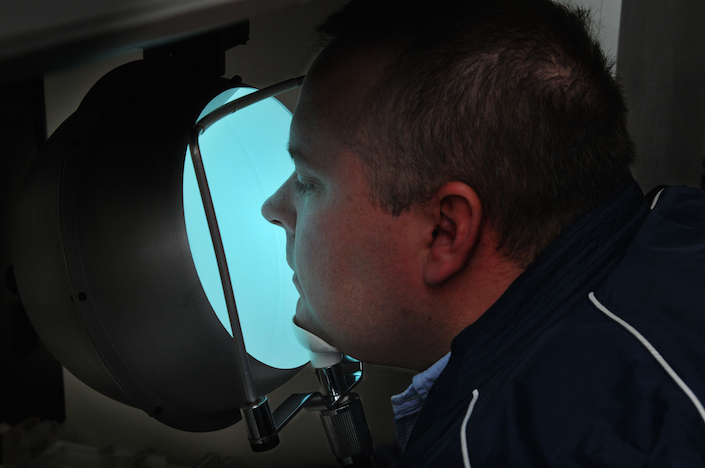Human Factors and Performance Team

Exposure to Monochromatic Blue Light. A study subject undergoes Ganzfeld exposure to monochromatic blue light at Jefferson Medical College of Thomas Jefferson University. Photo by Dave Super.
 Many factors can impact an astronaut’s ability to work well in space. The same can be said for the ground support crew’s efforts on Earth. The Human Factors and Performance Team is studying ways to improve daily living and keep crewmembers and other personnel healthy, productive and safe during long-duration space missions.
Many factors can impact an astronaut’s ability to work well in space. The same can be said for the ground support crew’s efforts on Earth. The Human Factors and Performance Team is studying ways to improve daily living and keep crewmembers and other personnel healthy, productive and safe during long-duration space missions.
Overall Team aims are to reduce performance errors and mitigate habitability, environmental and behavioral factors that pose significant risks to mission success. The Team develops guidelines for human systems design and information tools to support crew performance.
Team members are examining ways to improve sleep and scheduling of work shifts as well as how specific types of lighting in the spacecraft and habitat can improve alertness and performance. Other projects address improving the interactions between automated and manual control of a spacecraft and how environmental factors, such as moon or Martian dust, can impact crew health.
In addition to the benefits to space exploration, the Team’s efforts will benefit health and reduce errors and accidents on Earth in a wide range of professions, such as military and civilian aviation.
Leaders
Team Leader:
Elizabeth B. Klerman, M.D., Ph.D.
Harvard Medical School-Brigham and Women’s Hospital
Associate Team Leader:
Debra Schreckenghost, M.E.E.
TRACLabs Inc.
Impact in Space
The Human Factors and Performance Team’s research is intended to accelerate progress on countermeasures that reduce the risk of human performance failure and maximize performance capabilities during space exploration.
The anticipated deliverables for spaceflight include:
- Specific recommendations for the wavelength and intensity of lighting in the crew habitat;
- Recommendations for light-dark and work-rest schedules for crewmembers;
- Specified light transmission requirements for visors and windows;
- Recommended work-rest policies to facilitate alertness and performance during extended-duration missions;
- A mathematical-modeling tool for individualized evaluation of the impact of actual work-rest/sleep-wake and light-dark schedules on alertness and performance;
- Development of an integrated human-system model that includes perception, decision making and action in order to quantify and understand the effects of both human and automation errors as they propagate through a control system; and
- A system for predicting and preventing the deposition of lunar and Mars dust in the lung.
Impact on Earth
The benefits gained from the Human Factors and Performance Team’s research extend to health care and many other occupations on Earth. The Team has applications for Earth use in the following ways:
- Lighting recommendations – type, timing and intensity – to improve the safety and well-being of people working in jobs requiring international travel, shift work and extended schedules;
- Better models for assessing environmental exposure to particulate matter; and
- Improved ability to target drugs to specific areas of the lung, making it possible to achieve optimal results with small quantities of drugs and to minimize side effects.





